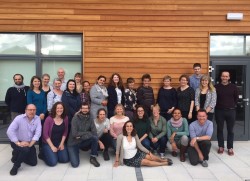Our People and Structure
 The SEGS department is organised into four groups: Environmental governance (led by Alice Hague [1]), Land and People (led by Maria Nijnik [2]/Annie McKee [3]), Changes in People-Place Relations (led by Mags Currie [4]), and Sustainable Transitions & Behaviours led by Kathryn Colley [5]. We work within and across groups on a wide range shared research interests, and our research aims to inform understanding of real-world problems, often working with stakeholders, to improve outcomes through inclusive, ethically responsible research.
The SEGS department is organised into four groups: Environmental governance (led by Alice Hague [1]), Land and People (led by Maria Nijnik [2]/Annie McKee [3]), Changes in People-Place Relations (led by Mags Currie [4]), and Sustainable Transitions & Behaviours led by Kathryn Colley [5]. We work within and across groups on a wide range shared research interests, and our research aims to inform understanding of real-world problems, often working with stakeholders, to improve outcomes through inclusive, ethically responsible research.
Our research explores the complexities – and consequences – of how different actors, policies, and institutions are intertwined in decisions that affect the natural environment and land management. We investigate and inform decision-making and processes in Scotland, the UK and beyond.
Our department comprises social scientists from a wide range of disciplinary backgrounds, including sociology, ecological and environmental economics, politics, anthropology and geography. We accordingly draw on a variety of theoretical approaches and concepts.
We use a wide range of research approaches and data collection methods ranging from semi-structured interviews, focus groups or workshops, scenario-planning processes, ethnographic methods and observational data, to video and other visual methods such as digital story-telling. We also use mixed methods and quantitative methods such as surveys, choice experiments and modelling approaches. Increasingly the group explores how virtual platforms and methods e.g. Delphi, webinars, virtual reality, can complement face-to-face interactions for data collection.
Examples of topics studied across our reserach groups and Department
- Digitalisation in rural areas and of farming systems
- Natural capital accounting, valuation and use in decision-making & value chains
- Environmental policy coherence & integration
- Social innovation in rural areas & smart villages
- Partnership working and governance at catchment & landscape scales
- Environmental justice and conservation conflicts
- Social and behavioural aspects of the transition to a circular economy
- Food and nutrition security, sustainable food systems and socio-technical change
- Games and gamification of farming practices
- Futures-oriented approaches to planning multifunctional land-use
- Nature-based solutions to environmental challenges
- Transition to green post-carbon economies & societies
- Land Use, Land Use Change and Forestry (LULUCF) to mitigate climate change
- Agri-tourism and other forms of rural diversification
- Land rights and land access
- Outdoor recreation, access to greenspace, and health and wellbeing
- Agricultural knowledge systems, on-farm demonstration & peer-to-peer learning
- Demographic and socio-economic change in sparsely populated areas
- Place-based policy and community resilience
- Sustainability transitions (including energy infrastructure)
- Everyday environmental behaviour (including energy, transport, and food)
- Representing people-environment interactions in computational models
Click here to return to our main SEGS page [6].
To view our twitter feed, visit: https://twitter.com/HuttonSEGS [7]
Links:
[1] https://www.hutton.ac.uk/staff/alice-hague
[2] https://www.hutton.ac.uk/staff/maria-nijnik
[3] https://www.hutton.ac.uk/staff/annie-mckee
[4] https://www.hutton.ac.uk/staff/mags-currie
[5] https://www.hutton.ac.uk/staff/kathryn-colley
[6] https://www.hutton.ac.uk/research/departments/social-economic-and-geographical-sciences
[7] https://twitter.com/HuttonSEGS
[8] https://www.hutton.ac.uk/staff/tony-craig
[9] https://www.hutton.ac.uk/staff/liz-dinnie
[10] https://www.hutton.ac.uk/staff/kerry-waylen
[11] https://www.hutton.ac.uk/blogs/introduction-segs
[12] https://www.hutton.ac.uk/research/segs-active-projects